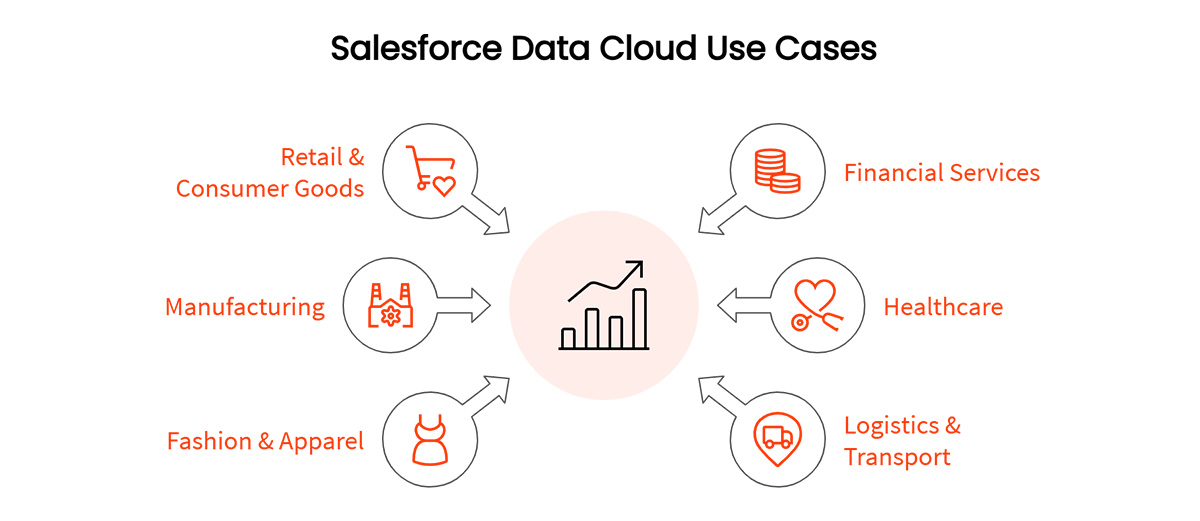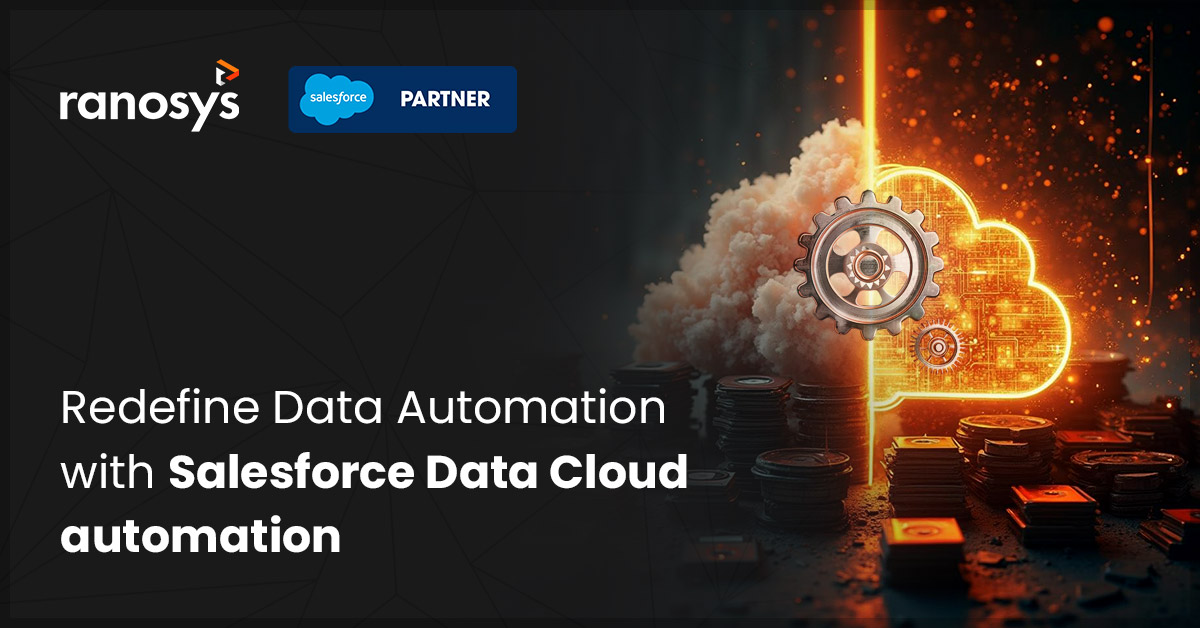Talk to our experts
Every business runs on data, and the business world is drowning in data. However, how that data is collected, managed, and used can make or break growth. Traditional data management methods like manual integration challenges, siloed databases, and static reports can no longer keep up with the rising customer expectations. That’s where Salesforce Data Cloud automation comes in to handle the customer data.
In this blog, we’ll break down what Salesforce Data Cloud is, how it compares with traditional data management, the challenges of traditional data management, and why automated data management solutions are becoming the smarter choice for enterprises.
What is Salesforce Data Cloud?
Salesforce Data Cloud is a real-time customer data platform that brings data together from all the touchpoints to create a unified customer profile. The data could be from any source, like CRM, marketing, commerce, services, ERP, and even third-party systems.
Unlike traditional platforms that just store data, Salesforce Data Cloud capabilities include real-time ingestion, identity resolution, and instant activation across all Salesforce applications. It’s built directly into the Salesforce ecosystem, which means your data works for you immediately and powers AI-driven agents like Agentforce for smarter, automated customer support.
What makes Data Cloud special? It can process streaming data as it happens, Salesforce Data Cloud automation tools automatically merge duplicate customer records, and push insights to your sales, marketing, and service teams without any manual intervention. Data Cloud drives smart and quick decisions, along with just managing and storing data.
Understanding Data Management: From Traditional to Next-Gen Automation
Data management has evolved from being just database storage to intelligent, automated systems that can think and act in real-time. But most businesses are still stuck in the old era of data handling.
Traditional data management relied on manual exports, spreadsheets, scheduled batch updates, and IT-heavy solutions that took weeks to implement even the smallest changes. This worked well when the businesses had only a handful of data sources and customer interactions were slower. But digital transformation accelerated, and these manual methods turned into roadblocks rather than bridges. Scaling became nearly impossible when the number of data streams grew from a few to dozens.
That’s where automated data management solutions like Salesforce Data Cloud change the game. Powered by AI, they handle data processing, data enrichment integration, and quality checks in the background. Businesses now can get real-time insights, instead of waiting for hours or days for reports to update. This helps you trigger personalized campaigns, service responses, or sales actions the moment something significant happens.
In other words, Salesforce Data Cloud transforms your data from a static record into a helpful asset, a force that drives decisions, scales naturally with your business, and works like a team of data scientists operating 24/7, without the overhead.
Traditional Data Management: Challenges and Limitations
Traditional data management was built for a different era, when data was structured, predictable, and moved at a slower pace. Today, businesses generate a massive amount of data, and legacy systems struggle to handle that. Here are some challenges of traditional data management systems that businesses often face:
1. Manual data integration: Traditional workflows rely heavily on exporting, cleaning, and importing data between systems. This process is not only slow but also prone to human error. By the time a static report is generated, the customer behavior it reflects may already be outdated.
2. Data silos and fragmented insights: Different teams often use separate tools and formats marketing, sales, and support may all record customer data differently. This lack of standardization creates duplicates, inconsistencies, and prevents a single source of truth. Research shows that nearly 72% of organizations struggle with cross-departmental data integration, leading to duplicated efforts and delayed insights.
3. Slow decision-making: Legacy systems typically rely on batch processing, meaning data is updated only periodically—often overnight. In fast-paced markets, this delay prevents businesses from acting on opportunities in real time, leaving them reacting instead of predicting.
4. Scalability limitations: As data volumes grow, traditional systems demand expensive hardware upgrades just to keep up. Even then, query performance often slows to a crawl. Companies are forced to overprovision infrastructure paying for capacity they don’t always need or risk system crashes and delays during peak demand.
5. Performance bottlenecks: Waiting minutes or even hours for reports to load has become a familiar frustration for many teams. Instead of analyzing data, employees spend valuable time waiting for results, which directly impacts productivity and business agility.
6. Lack of real-time capabilities: Perhaps the most critical limitation is that most traditional systems can’t process data in real time. Without real-time analytics, businesses are always looking in the rear-view mirror, making decisions based on yesterday’s insights rather than today’s customer behavior.
Feature Comparison: Salesforce Data Cloud vs. Traditional Approaches
Let’s get into the nitty-gritty of how these approaches actually stack up when you put them head-to-head. We’ve seen this comparison play out in real-world implementations, and the differences are more dramatic than you might expect.
| Features | Salesforce Data Cloud | Traditional Data Management |
| Data Processing Speed | Real-time streaming with sub-second updates | Batch processing with scheduled/overnight cycles |
| Integration Method | Zero-copy native connectors and 200+ pre-built integrations | Manual ETL processes, custom coding, data movement |
| Scalability | Elastic, cloud-native auto-scaling based on demand | Fixed infrastructure needing hardware upgrades |
| Identity Resolution | AI-powered automatic deduplication and merging | Manual data cleansing, duplicate management |
| Customer Profile Creation | Unified 360° profiles via automated identity resolution | Fragmented records, manual profile stitching |
| Data Activation | Native activation across the entire Salesforce ecosystem | Custom integrations required for each system |
| Data Quality Management | Built-in governance, cleansing, and compliance tools | Manual cleaning and periodic validation |
| Real-time Updates | Instant sync across all connected systems | Scheduled updates only, delayed data sharing |
| AI/Analytics Integration | Native Einstein AI and Copilot, prompt engineering | Separate analytics tools require manual setup |
| Implementation Time | Rapid deployment: 2–8 weeks | Lengthy, 3–12 months typical |
| Maintenance Requirements | Automated updates and cloud-managed patches | Manual maintenance, high IT support |
| Cost Structure | Pay-as-you-use, transparent subscription pricing | High upfront capex, unpredictable ongoing costs |
| Extensibility | Industry data models, flows, Copilot automation, zero-copy arch. | Limited flexibility, slow cross-system changes |
Use Cases: How Businesses Leverage Salesforce Data Cloud
The real test of any data management platform isn’t its features—it’s how businesses actually use it to solve problems and drive growth. We’ve seen some remarkable Salesforce Data Cloud use cases across different industries, and the results speak for themselves.

Retail & Consumer Goods
- Unifies shopper data from websites, apps, loyalty programs, and in-store purchases to enable real-time personalization at every touchpoint.
- Delivers targeted campaigns for promotions, cross-sell, and abandoned cart recovery, increasing conversion rates and customer loyalty.
- Empowers store teams with customer insights for premium in-store experiences and better recommendations.
- Automates segmentation and product recommendations based on live browsing and purchase behavior for higher engagement.
Financial Services
- Integrates transaction records, customer interactions, and life events to provide proactive, tailored financial guidance.
- Utilizes AI-driven analysis for fraud detection and risk mitigation, stopping fraud in real time while improving trust.
- Delivers highly personalized offers for loans, investments, and retirement planning based on unified profiles and behavior data.
- Streamlines compliance management and reporting with accurate, always up-to-date customer records.
Manufacturing
- Combines IoT sensor data, equipment logs, and customer interaction data for predictive maintenance, reducing downtime and cost.
- Automates supply chain tracking, allowing for instant response to demand shifts and logistics disruptions.
- Builds holistic B2B customer profiles that span sales, support, product usage, and operational metrics to identify upsell opportunities.
- Provides account managers with real-time information to address partner needs swiftly and predict potential risks.
Healthcare
- Integrates clinical records, patient behavior, and social determinant information into unified patient profiles for better care delivery.
- Reduces appointment no-shows and boosts engagement with personalized, data-driven reminders sent through each patient’s preferred channel.
- Enables predictive interventions using wearable and device data, helping providers identify at-risk patients and act faster.
- Supports regulatory compliance and security for patient data through automated data governance.
Fashion & Apparel
- Centralizes customer and transaction data from online, in-store, and campaign sources to enable dynamic, trend-driven personalization.
- Powers loyalty programs with real-time reward updates and exclusive offers based on individual shopping trends.
- Automates styling advice, early access, and product launches for VIP customers through AI-driven insights.
- Streamlines influencer and campaign targeting with segments built from social and purchase data.
Logistics & Transport
- Integrates shipment, inventory, and fleet tracking with real-time customer order data to optimize operations.
- Uses predictive analytics for route optimization, minimizing delays, and enhancing delivery accuracy.
- Automates exception handling and personalized notifications for customers and partners regarding order status and delivery updates.
- Enables holistic logistics performance monitoring across regions, helping teams respond quickly to disruptions.
Final Thoughts
Traditional systems can’t keep up with today’s pace of business. Manual data integration challenges, siloed insights, and delayed reports slow teams down and keep them reactive. In contrast, Salesforce Data Cloud automation delivers real-time intelligence, unified customer profiles, and scalable automated data management solutions that empower enterprises to act faster and smarter.
Combine Salesforce Data Cloud automation with Agentforce, and you get AI-powered agents that work 24/7, resolving routine queries instantly, escalating complex issues with full context, and freeing your teams to focus on high-value work. By leveraging Salesforce Data Cloud features from identity resolution to AI-driven insights, you can transform your data into a true growth driver. At Ranosys, our Salesforce Data Cloud consulting services help businesses harness these capabilities end-to-end, ensuring seamless implementation, integration, and optimization. These are the real Data Cloud benefits for enterprises ready to move beyond outdated systems.
Why Partner with Ranosys for Salesforce Data Cloud Automation
As a 3X award-winning Salesforce Summit ( Platinum) partner with a strong global presence across the US, UK, Singapore, and India, Ranosys brings deep expertise in Salesforce Data Cloud automation. We help enterprises unify, activate, and scale their data to unlock real-time insights and business growth.
- End-to-End Implementation: From initial strategy and architecture design to full Data Cloud setup, configuration, and ongoing optimization, Ranosys ensures smooth implementation tailored to your business goals.
- Data Migration & Integration: We simplify migration from legacy systems and integrate Data Cloud seamlessly with external platforms, CRMs, ERPs, and marketing tools to create a unified data ecosystem.
- Data Audits & Optimization: Our consultants conduct comprehensive audits to resolve silos, improve data quality, and optimize performance for maximum ROI.
- Industry-Specific Solutions: With experience across retail, manufacturing, healthcare, travel, hospitality, and technology, we deliver tailored Data Cloud solutions that address sector-specific challenges and opportunities.
- Multi-Cloud Expertise: Our proficiency spans Sales Cloud, Service Cloud, Marketing Cloud, Commerce Cloud, and MuleSoft, ensuring your Data Cloud implementation aligns seamlessly with your wider Salesforce ecosystem.
- Ongoing Support & Training: We provide Salesforce managed services, continuous optimization, and hands-on training so your teams can fully leverage Data Cloud’s capabilities as your business evolves.




